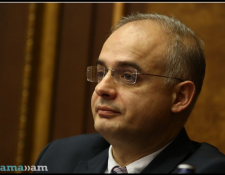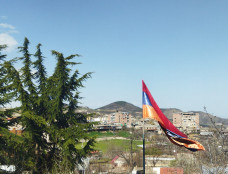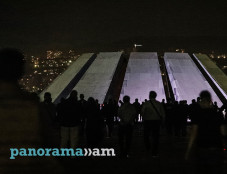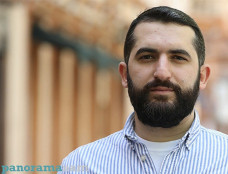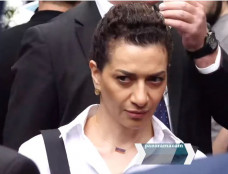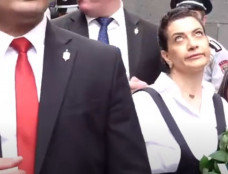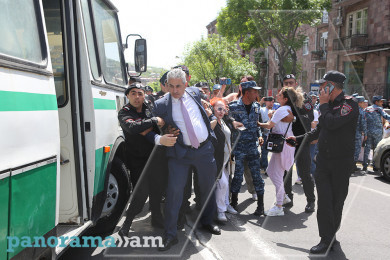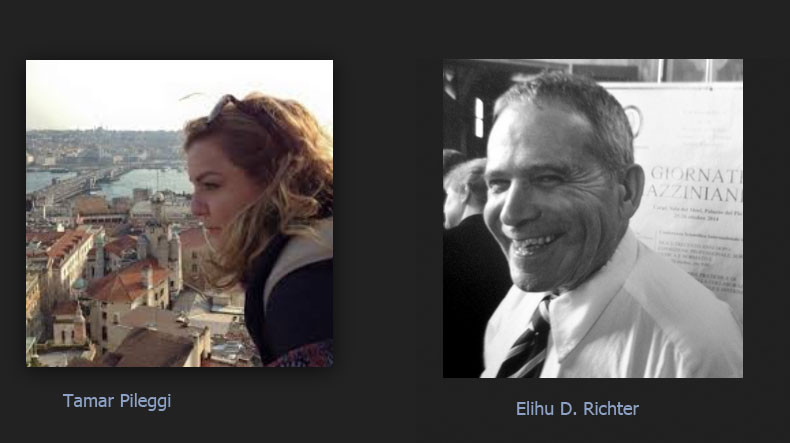
Elihu D Richter: There must be zero tolerance for incitement and hate speech for preventing genocide
Hate speech, incitement and genocide prevention are major challenges of our times which still remain unaddressed despite the danger they pose for the humanity. These are outstanding issues today also for Armenians because of the hate and incitement the Azerbaijani state breeds against Armenia and Armenians.
Panorama.am has spoken with Israeli scholars Prof. Elihu D Richter – an epidemiologist from Hebrew University and founder of the Jerusalem Center for Genocide Prevention and Tamar Pileggi – breaking news editor at The Times of Israel, who have been studying the issues of incitement and hate speech using epidemiological models. Their research shows that hate speech and incitement are the main catalysts for mass violence and genocide and they believe that genocide prevention would be possible if there is zero tolerance for incitement. They also conclude that no peace agreement between conflicting parties can be viable unless hate speech and incitement are deterred and punished.
Panorama.am: Prof. Richter, what is the common ground between epidemiology and genocide incitement?
Elihu Richter: Genocide kills a lot of people, which is what an epidemic does. When studying historical cases of genocide I understood that there are predictors, which means it is possible to predict and to prevent genocide. Among key predictors of genocide are hate language and incitement, which provoke people to carry out atrocity crimes and genocidal acts – mass murders, forced explusions and more. We have thus been studying the role of incitement and hate language as a hazardous exposure (similar to toxic exposures) – initiator, catalyst and predictor of atrocity crimes using epidemiological models of prediction and prevention. I have looked into how it is shaped, how it spreads, what its effects are and how we can either stop it or reverse its consequences.
In epidemiology we track and measure air pollutants and their health effects on exposed populations. Likewise, by tracking and measuring messages of hate on the airwaves we can monitor the intensity and frequency of hate messages and their effects on attitudes and actions. We can also track incubation periods, that is, how much time elapses between the onset of incitement and the outbreak of violence. I use the term Word Pollution as it best describes the situation with the dissemination of hate language. I must say that we are today with regard to word pollution where we were in the 19th century with regard to air pollution – we observe Word Pollution worldwide, especially in the Middle East. It is a major challenge of our times!
Panorama.am: How do you define incitement to genocide? What are the common forms of incitement you have looked into?
Elihu Richter: In order to get A to kill B, the target must first be dehumanized in the eyes of A – that’s exactly what incitement and hate speech does. We have looked at all the common forms of incitement and hate language, namely – 1) dehumanization (A calls B a pig, a cockroach, etc. which implies that the person is no longer human); 2) demonization (implies that a certain group poses a threat and is the source of all evil); 3) delegitimization (when one group denies the very existence of the other group and its history as a political and national unit, as though they have never existed in a certain geographical area in the past); 4) defamation; 5) disinformation (spreading lies, falsification and “rewriting” history in a way the inciter prefers); 6) denial of past genocide is also a form of incitement as it can lay the groundwork for future genocides – in these terms who knows better about the denial than the Armenian people? Incitement also includes words that directly stimulate to action, such as threats, decrees, praising perpetrators of genocidal terror or elevating them to the status of a hero.
Panorama.am: Incitement and hate speech are qualified as crimes under the international law. Is there a proven cause-effect relationship between hate speech/incitement and atrocity crimes/genocide? What has your study shown?
Elihu Richter: The cause-effect relationship between hate language/incitement and violence, notably genocide was recognized at Nuremberg Trials after World War II as well as in Rwandan trials. Hate language and incitement are also defined as crimes against humanity in the UN Convention on the Prevention and Punishment of the Crime of Genocide and in the Rome Statute of the International Criminal Court, based on the evidence amassed during the Nuremberg and Rwandan trials.
Since World War II, the fields of genocide studies, behavioural and social psychology case studies have presented a large body of evidence showing that hate language and incitement, especially in authoritarian settings, can motivate and direct individuals, groups, or even entire communities, to commit hate crimes on a large scale.
Our research also showed in all the cases mass atrocities were preceded by hate language and incitement. In many cases authoritarian regimes in particular have used incitement in order to mobilize their populations for the cause of armed struggle rather than the cause of peace.
Thus when we are talking about preventing Genocide we should first and foremost focus on preventing incitement. The minute mass killing starts, it is too late. Incitement and hate speech are early warning signs for mass killings. Because there is incitement it doesn’t mean that there is necessarily going to be violence, however any time we witness racially, ethnically or nationalistically motivated violence against a group of people incitement always precedes it. Even though sometimes it is painted as spontaneous uprising, it is almost never the case. It is something that people are exposed to and they get used to it, it becomes normal as they believe they are doing a useful thing for the right cause – the end justifies the means. The Turkish doctors for instance justified killing the Armenians during the Genocide because they believed that this was the “right thing to do” for their country and their society.
Tamar Pileggi: Incitement very often also contains intention to mislead and brainwash people, to get them angry and to use their nationalistic, religious and other sentiments to bring them to the point when they commit it. They try to make them think it is the right thing to do and that by violence they are solving a problem.
Panorama.am: How does the practice of hate speech and incitement affect a conflict and the prospects of peace?
Elihu Richter: Our study suggests that what is called “economic peace” cannot override the negative impacts of population-wide incitement and hatred. We also suggest that no peace agreement can be sustainable without an end to such incitement.
What we are facing today is the cradle to grave Jihadist Islamist incitement which is pandemic in much of the Muslim world. In the Islamic world the state-level incitement has been going on for at least 50-60 years, in fact much longer.
In the case of Palestine we have tracked statements from senior public officials, religious authorities, the media, scholarly literature, school textbooks and so on. We see that substantial segments of the population are regularly exposed to stereotypes about Israeli Jews and their history – with a lot of delegitimization and demonization – these hate messages are transferred from parents to young children at home; hatred and stereotypes are also embedded in elementary and high school textbooks, in poetry and popular songs, they are used in youth movements, places of worship, universities and elsewhere – this is an intergenerational transmission of messages of hate. This undermines the future prospects of peace between those nations or communities that practice this.
I was in the Commission that was looking at textbooks in the Middle East (Israeli and Palestinian textbooks in particular), and the takeaway message is – “tell me what you are teaching your kids and I will tell you what they will be in 25 years”. Unfortunately the picture is not a good one so far. Problematic as it is in Palestinian texts the level of incitement is much worse in Jordanian, Syrian, Egyptian and Saudi texts.
Panorama.am: How do you think the problem of hate speech and incitement should be tackled? What are the solutions you propose?
Elihu Richter: My belief is that measures directed at perpetrators in the environment of total incitement will only be effective if you deal with system-wide exposure to incitement in the entire society from cradle to grave.
As for outside measures, economic sanctions can also have an impact on reducing the levels of incitement in some cases. We have shown a positive correlation between nuclear enrichment and incitement/terror in the case of Iran – the stronger was the pursuit for nuclear enrichment the higher was the level of incitement and verbal aggression. More importantly, when international sanctions increased, incitement and enrichment slowed down, and when sanctions weakened, both became worse, as did human rights violations.
Today there is an urgent need to focus on prevention component of the Convention on the Prevention and Punishment of the Crime of Genocide and to take measures against hate speech and incitement everywhere in the world. We have to redefine Word Pollution as unacceptable and have zero tolerance for it, the same way as people in the 19th century decided that they were not going to tolerate the long-standing smog in the streets of London.
Tamar Pileggi: It is already well known that hate speech and incitement is for 100% one of the biggest contributing factors to the crime of genocide and the fact that we don’t give it enough attention or take it seriously is criminal – it is something very dangerous to let it to go by without acknowledging how serious it is. The international humanitarian law clearly states that hate language and incitement are crimes, but the problem is that there is actually no mechanism to reinforce this. There needs to be more cooperation and more mechanisms that would punish the perpetrators and those guilty in these crimes. We must also come up with real and effective early warning signs so when there is a population in trouble something can be done.
Panorama.am: What is the role of the third parties in preventing or encouraging genocide?
Elihu Richter: There is a fundamental principle which should guide our approach –genocide, evil, mass murder, etc. results from human choice and bystander indifference. And the bystander indifference is as important, if not more important, contributing factor than the acts of the perpetrators, because perpetrators pay close attention to it. Here the role of moral agency and human choice is critical. I am concerned about the retreat from recognizing the importance of moral agency.
Perpetrators often state their intent clearly, but many times, bystanders pretend not to notice it, though if they did, things would be different. Bystander indifference and inaction was plainly demonstrated in the case of Rwanda. In the case of the Armenian Genocide, despite Henry Morgenthau’s countless telegrams, the US and the world at large was an indifferent bystander; it has been a bystander ever since!
This is why until we stigmatize by-standerism we won’t get anywhere. I believe we have to once and for all make a decision that taking an action is the default, rather than an option. If you see a threat emerging and you don’t act, you have a part in it by allowing it to happen.
Panorama.am: Speaking about by-standers, as we know Israel keeps denying the Armenian Genocide. It also sells weapons to Azerbaijan, where hatred and threats against Armenians have reached tremendous proportions. What is your view on the position of Israel regarding this matter?
Elihu Richter: This is very tragic for me. There is no excuse for Israel’s refusal to recognize the Armenian as well as the Assyrian and Greek genocides. We owe it to ourselves to recognize this. Israel has a very strong relationship with Azerbaijan (Jewish community in Azerbaijan, trade of oil and weapons, etc), but this doesn’t at all justify our bystander position. Neither does it excuse Azerbaijan’s incitement. The issue of hate language of Azerbaijan must surely be raised in Israel.
Prof. Elihu D. Richter is a medical doctor, epidemiologist who has worked in Israel and in the United States. He is the founder of the Jerusalem Center for Genocide Prevention at Hebrew University and is one of the pioneers in the field of epidemiology of genocide. Among the studies he co-authored is Incitement and Hate Language, Hate Education and their Role in Promotion of Violent Conflict and Atrocity Crimes – an Epidemiologic Perspective.
Tamar Pileggi is breaking news editor at The Times of Israel and Co-founder of Jerusalem Center for Genocide Prevention.
Interview by Nvard Chalikyan
Newsfeed
Videos





